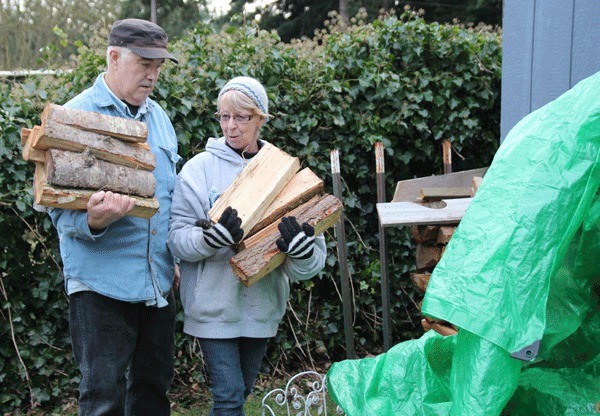Wayne Killebrew admits he’s a little embarrassed by the state of his neighborhood.
Tucked away just north of Oak Harbor, the mobile home park once called Thunderbird is filled with 59 ancient, moss-covered, single- and double-wide trailers. Many are in various states of disrepair, with tarps and other makeshift patches covering holes in thin walls.
Some yards are littered with junk.
A group of youngsters arrive in a school bus on a cold Thursday afternoon and walk through the park to homes that may not have adequate heat or septic systems.
But, Killebrew said, things are changing dramatically for the better.
“We’re going to have a real decent park here in about a year,” he said. “It will look 100 percent better.”
The change is coming from within. Residents of the park formed a cooperative and purchased the park for $1.57 million.
The deal was closed Nov. 25, just in time for Thanksgiving.
That means the residents don’t have to fear eviction as other residents of North Whidbey mobile home parks have in recent years. Two such parks in Oak Harbor were razed by developers, leaving dozens of residents scrambling to find new homes.
The loss of trailer parks only exacerbated the city’s and county’s problems with a lack of affordable housing. The city’s new economic development plan, for example, shows 51 percent of owner-occupied houses and 46 percent of rental units in the city are considered unaffordable under federal standards that compare incomes and housing costs.
The residents of the new co-op, however, benefitted from a program started years ago in New Hampshire and grew into ROC USA, a nonprofit organization with a national network of eight organizations and a national financing source for co-ops, according to Mike Bullard, community and marketing manager for ROC USA.
The organizations include the Northwest Cooperative Development Center, an Olympia-based nonprofit that helped with the Thunderbird project.
Eric Bowman, co-op development specialist with the Northwest Cooperative, said residents of trailer parks usually own their homes, but rent the land within the park. That arrangement leads to economic instability since the residents are vulnerable to rate increases or eviction if the land is sold.
There’s also a quality of life issue. Killebrew said the former owner of Thunderbird didn’t enforce community rules and refused to fix problems, leading to the current state of disrepair.
Bowman said the group approached the owner and the residents after finding that Thunderbird was for sale; everyone was receptive.
“The people at Thunderbird are very excited about changing the character of their neighborhood,” he said.
The residents are low-income families with children and retirees on fixed incomes, but many still do what they can to help each other. Killebrew and his wife, Sallie, for example, stacked firewood Thursday for a neighbor raising a great grandchild and whose furnace is broken.
“The pride they take in their community is very touching,” Bowman said.
Bullard explained the two organizations helped the residents through the process of creating a co-op and purchasing the park. The purchase was financed at very low rates through ROC USA Capital and the Washington State Finance Commission.
Homeowners in the community have each purchased one low-cost share to become a member of the co-op, though a couple of residents are hold outs.
They pay a monthly fee to cover the mortgage, taxes and incidentals.
Killebrew explained that rent had been $310 a month, but now residents will pay $330 a month.
As part of the financing, a fund was created for the co-op to cover necessary improvements. Killebrew said a number of homes need new septic systems. There are trees that need to be trimmed or removed for safety’s sake.
Each home gets one vote in the new co-op board of directors.
The members of the co-op elect a Board of Directors to act on day-to-day issues and vote on larger matters like the annual budget, by-laws and community rules.
Killebrew vows that the new rules over things like junk vehicles and garbage will be enforced, starting with gentle reminders and offers of help.
The first action, he said, will be to change the name of the reinvigorated community. Sallie Killebrew said “Thunderbird” had a bad reputation because of criminal activity in the past.
The cooperation was formed under the name Whispering Pine, but Wayne Killebrew said people don’t like that either because it sounds like the name of a funeral home.
One idea, he said, is simply “Whidbey Community Co-op.”
The Killebrews said the are very optimistic about the future for the park. The neighbors are all getting to know each other as part of the process, which they feel is key to building a sense of community and pride in the neighborhood.
“We want the island to know we want it better,” Sallie Killebrew said. “We want the kids to feel safe. We want to build a community that helps each other.”



